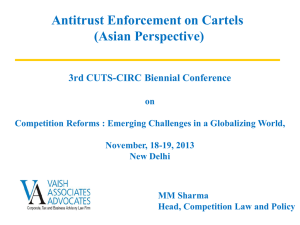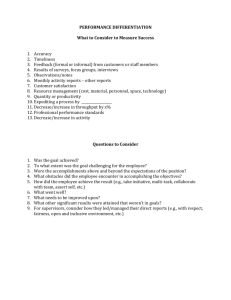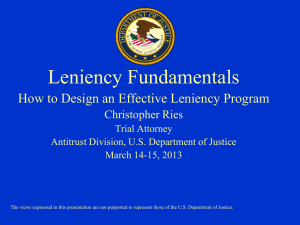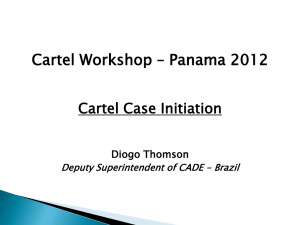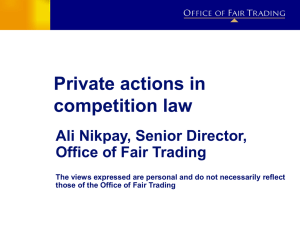CJEU Reaffirms Independence of EU and Member States Leniency Programs
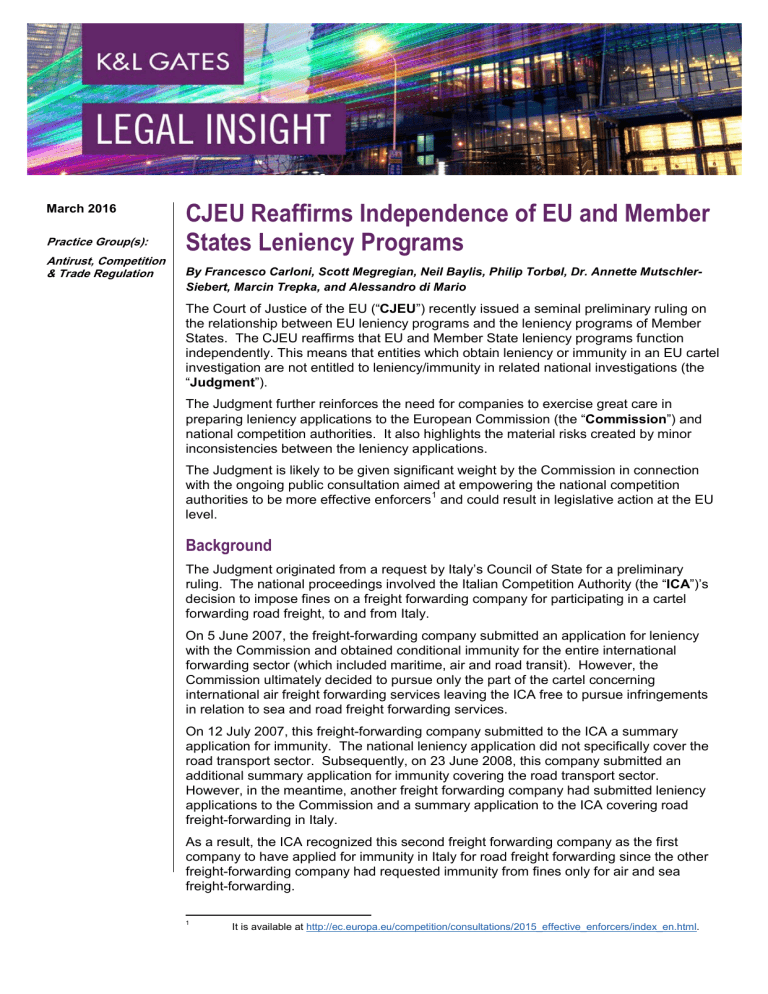
March 2016
Practice Group(s):
Antirust, Competition
& Trade Regulation
CJEU Reaffirms Independence of EU and Member
States Leniency Programs
By Francesco Carloni, Scott Megregian, Neil Baylis, Philip Torbøl, Dr. Annette Mutschler-
Siebert, Marcin Trepka, and Alessandro di Mario
The Court of Justice of the EU (“ CJEU ”) recently issued a seminal preliminary ruling on the relationship between EU leniency programs and the leniency programs of Member
States. The CJEU reaffirms that EU and Member State leniency programs function independently. This means that entities which obtain leniency or immunity in an EU cartel investigation are not entitled to leniency/immunity in related national investigations (the
“ Judgment ”).
The Judgment further reinforces the need for companies to exercise great care in preparing leniency applications to the European Commission (the “ Commission ”) and national competition authorities. It also highlights the material risks created by minor inconsistencies between the leniency applications.
The Judgment is likely to be given significant weight by the Commission in connection with the ongoing public consultation aimed at empowering the national competition authorities to be more effective enforcers
and could result in legislative action at the EU level.
Background
The Judgment originated from a request by Italy’s Council of State for a preliminary ruling. The national proceedings involved the Italian Competition Authority (the “ ICA ”)’s decision to impose fines on a freight forwarding company for participating in a cartel forwarding road freight, to and from Italy.
On 5 June 2007, the freight-forwarding company submitted an application for leniency with the Commission and obtained conditional immunity for the entire international forwarding sector (which included maritime, air and road transit). However, the
Commission ultimately decided to pursue only the part of the cartel concerning international air freight forwarding services leaving the ICA free to pursue infringements in relation to sea and road freight forwarding services.
On 12 July 2007, this freight-forwarding company submitted to the ICA a summary application for immunity. The national leniency application did not specifically cover the road transport sector. Subsequently, on 23 June 2008, this company submitted an additional summary application for immunity covering the road transport sector.
However, in the meantime, another freight forwarding company had submitted leniency applications to the Commission and a summary application to the ICA covering road freight-forwarding in Italy.
As a result, the ICA recognized this second freight forwarding company as the first company to have applied for immunity in Italy for road freight forwarding since the other freight-forwarding company had requested immunity from fines only for air and sea freight-forwarding.
1
It is available at http://ec.europa.eu/competition/consultations/2015_effective_enforcers/index_en.html
.
Court of Justice of the EU Reaffirms Independence of EU and Member
States Leniency Programs
The ICA decision was challenged before the administrative tribunal of Lazio on the grounds that the ICA should have granted immunity in Italy to the first freight forwarding company for all three freight-forwarding sectors, including road transport, and that the
ICA was required to assess its summary application for immunity in Italy in light of the application for immunity filed at the EU level. The tribunal’s ruling upholding the ICA’s decision was appealed to Italy’s Council of State which sought the CJEU’s preliminary ruling on a number of issues stemming from the interplay between EU and Member State leniency programs.
The impact of the Judgment
In the Judgment, the CJEU held that the European Competition Network (“ ECN ”)
does not have the power to adopt legally binding rules. As a result, the treatment of leniency applications sent to a national competition authority is determined by that authority under its national law.
According to the CJEU, national competition authorities are free to adopt leniency programs and each of those programs is autonomous as regards both other Member
State’s programs and the EU leniency program.
As a consequence, no provision of EU cartel law requires national competition authorities to interpret a summary application in the light of an application for immunity submitted to the Commission, irrespective of whether or not that summary application accurately reflects the content of the application submitted to the Commission.
Moreover, in case of a discrepancy between the EU leniency application and the summary application, there is no obligation for the national competition authority to contact the Commission or the applicant.
Finally, as far as the ECN Model Leniency Program is concerned, Member States are not precluded from adopting rules not provided in such model program or which diverge from it, so long as that competence is exercised in compliance with EU law. However,
Member States may not render the implementation of EU competition law impossible or excessively difficult and must ensure that the national rules which they establish or apply do not jeopardise the effective application of Articles 101 and 102 of the Treaty on the
Functioning of European Union.
Implications for companies
Although the Judgment does not create new law, it does reaffirm the independence of the
EU and national leniency regimes.
The Judgment also reaffirms that, in the event of inconsistencies (even if apparently modest), an applicant cannot rely on a broader scope in its EU leniency application to protect itself from fines by national competition authorities.
As a result, applicants must take great care to ensure that they file leniency applications in all relevant jurisdictions and that these applications are consistent as regards the scope of conduct covered. Applicants must file summary applications in all potentially relevant EU jurisdictions and provide sufficient information to the national competition authorities to keep those summary applications updated so as to ensure that they are covered in the event that the Commission decides to limit its investigation to only certain
2
The ECN comprises the Commission and the national competition authorities with the objective of ensuring the effective and consistent application of competition rules and the development of best practices, including the adoption of the ECN Model Leniency Program.
2
Court of Justice of the EU Reaffirms Independence of EU and Member
States Leniency Programs
aspects of a cartel, leaving the national competition authorities free to pursue other aspects of the cartel at the national level.
The pitfalls created by the current system of parallel competences introduced by
Regulation 1/2003, and the absence of a centralized EU leniency program, has long been recognized. However, these issues are likely to be carefully considered by the
Commission in the context of its ongoing public consultation and may fall within legislative proposal reforms to address these shortcomings in the near future.
Authors:
Francesco Carloni francesco.carloni@klgates.com
P +32.(0)2.336.1908
Scott S. Megregian scott.megregian@klgates.com
P +44.(0)20.7360.8110
Neil A. Baylis neil.baylis@klgates.com
P +44.(0)20.7360.8140
Philip Torbøl philip.torbol@klgates.com
P +32.(0)2.336.1903
Dr. Annette Mutschler-Siebert annette.mutschler-siebert@klgates.com
P +49.(0)30.220.029.355
Marcin Trepka marcin.trepka@klgates.com
P +48.(0)22.653.4214
Alessandro di Mario alessandro.dimario@klgates.com
P +32.(0)2.336.1938
3
Court of Justice of the EU Reaffirms Independence of EU and Member
States Leniency Programs
Anchorage Austin Beijing Berlin Boston Brisbane Brussels Charleston Charlotte Chicago Dallas Doha Dubai
Fort Worth Frankfurt Harrisburg Hong Kong Houston London Los Angeles Melbourne Miami Milan Newark New York
Orange County Palo Alto Paris Perth Pittsburgh Portland Raleigh Research Triangle Park San Francisco São Paulo Seattle
Seoul Shanghai Singapore Sydney Taipei Tokyo Warsaw Washington, D.C. Wilmington
K&L Gates comprises approximately 2,000 lawyers globally who practice in fully integrated offices located on five continents. The firm represents leading multinational corporations, growth and middle-market companies, capital markets participants and entrepreneurs in every major industry group as well as public sector entities, educational institutions, philanthropic organizations and individuals. For more information about K&L Gates or its locations, practices and registrations, visit www.klgates.com
.
This publication is for informational purposes and does not contain or convey legal advice. The information herein should not be used or relied upon in regard to any particular facts or circumstances without first consulting a lawyer.
© 2016 K&L Gates LLP. All Rights Reserved.
4

